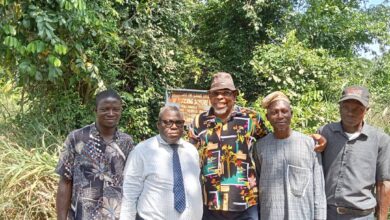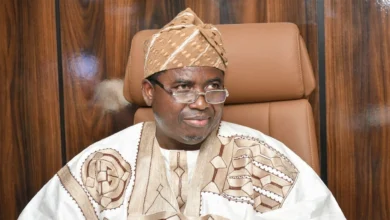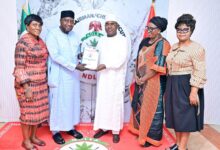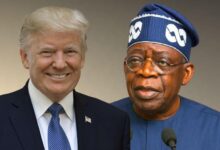RECAP: Why I’m still in exile – Peter Enahoro

*I regret some mistakes I made at Daily Times
By Bashir ADEFAKA
Peter Pan, is the pen name of Mr. Peter Enahoro. Peter is younger brother to the former Federal commissioner for information and frontline pro-democracy activist, Chief Anthony Enahoro.
Peter Enahoro, is a great author, distinguished journalist and media administrator of repute. Peter started out his journalism career in the Daily Times Plc at the youthful age of about 19 and rose through the ranks to become the media company’s managing director/editor-in-chief before quitting and retiring into self-exile.
A day before the official launch of his fourth and current book, ˜Then Spoke The Thunder, the publisher of England-based Africa Now magazine spoke to BASHIR ADEFAKA in Lagos shortly after he flew into the country. He had fled many years ago due to circumstances he claimed were beyond his control. Peter Pan as he is fondly called will be 75 years old on January 25th, 2010. Excerpts:
Years after your retirement as Editor, you have still not lost the magic of writing, what is the secret?
Well, to be quite frank, I don’t know whether I should be talking of the magic. I think it’s for other people to talk of the magic, if there is magic.
Journalism is my profession. I started out in journalism at the age of 19 or 20. I was lucky to be given chances, which I took very earlier on and I was also very lucky to work with people who saw a future in me and went out of their way to help me, because I think there is a mistake in some minds that journalism is something you study in a classroom, you are given a certificate at the end of it. But no, journalism is more than that. It is something you learn as you go along.
I have never believed for instance that, if people who are writers are asked to be truthful, they will say that writing is a vocation. You spend a lot of time, lonely time, lonely hours, sometimes you isolate yourself.
It is an old saying that a journalist is a man or a person who knows a little about a lot and a lot about a little. A journalist is somebody who, one evening he is with a lawyer. He is not a lawyer neither is he an expert in law but he should be able to hold a sensible, reasonable discussion with a lawyer about aspects of law that affect the everyday person.
The next night he might be with the doctor and he has a fair knowledge of what he is talking about. And then a week later he is with an armed robber and he is interviewing the armed robber and he has to ask the right question. He has to have the right approach. He has to have the certain basic understanding of the mind of that armed robber or try to explore to find out the mind of that robber, which requires a certain empathywith him. That is what makes journalism fascinating.
If I were to use the word magic, which I would hesitate to use if you ask me what is the magic, I will simply say that I am interested in a wide range of subjects and I have always believed that what is worth doing is worth doing well. So, I try to do my best to understand it and to discuss it.
Before you became managing director of Daily Times you were the Editor.
Yes.
Sometime in January 1966 when one of your reporters, then Mr. Segun Osoba, who is now a chief, tried to locate you to inform and get your approval to write a story on his discovery of the bodies of Prime Minister, Sir Abubakar Tafawa Balewa and Okotie-Eboh, you were no where to be found and so the story did not come out the following day. Where did you go and when you returned, what did you do to fill the gap?
No, I did not fill the gap. It was Segun who filled the gap. He came to report to me that Balewa’s body had been found. As I recall, I was at home I think. I said well we are not going to publish gossip, you have to go out of your way to find out the truth, go and get a story out of it.
It may not be understood in today’s terms how tensed things were and how daring it had to be for Segun Osoba to go after that story. Today it will be difficult for people to understand. But it was the first time that things like that were happening in our country: Prime Minister was abducted, Prime Minister was murdered, his body was found callously left in the bush.
People were shocked, people were dismayed and the journalist in Segun Osoba came out! You know, there are times when a turning point comes either in your career or an opportunity calls for it. If you seize that moment, it can turn your life or it can reveal who you are.
In a sense, other things did happen to make Segun what he became. But I would say in a sense – that story was turning point for him in his career.
If you asked him to go after the story and find out the truth and the following day the story did not come out, why should I not believe that.
May be, he did not do what you asked him to do?
Not at all. I have lost memory of some of the things that followed. I honestly don’t quite remember the details.
But the truth is that you were not found at your Silver Crescent residence in the first instance to be told the story of what he found?
(cuts in) Don’t even bother to call that street a name. There was no street name. It was a bush and I was the only person on my street. It used to be said that time that if you were the first to move into a place, you put your name on that street and that became official. But I didn’t do that because that place was under the Western Regional Government, Shomolu.
What is now Anthony Village was called extension to Shomolu Scheme. And if I had gone and put my name there, the Western Regional Government would have had the pleasure of ridiculing me and said that I named the street after myself. That is aside.
Yes, I don’t know at what point Segun came looking for me but the fact is that I fled my house. I had to run away.
Why should that be?
I left the house for safety. And then it was just sheer luck that I had to leave because, the night of the day I left, six soldiers came in a Land-Rover looking for me. It was my father who told me in the morning of that day, before they came in the night, that I should leave the house. Call it premonition, call it luck, call it whatever, but the old man was right. I left and when they came at midnight, I was not at home.
Permit me to dig into how you became editor of Daily Times at that time?
I am a believer in destiny and I asked myself sometimes, what do we call luck, is it luck or is it predestined to happen to us? I don’t know because, when a sequence of events occur and they lead to something, I think it is presumptuous to say that it is because one is efficient. I wasn’t the only journalist. I wasn’t the most efficient. I wasn’t the cleverest.
But I think there was something about destiny in it.
I had left the Daily Times following some minor disturbance that we caused: Some of my friends were sacked, I wasn’t sacked but I thought because of the act, I could not continue to work in the Daily Times when I wasn’t penalized.
Eventually I left but then I came back about a year or so later. By then Alhaji Jose was editor of the Daily Times and one night; I, a young sub-editor, was waiting to give the chief sub-editor a lift home. I had a motorcycle. I lived in Yaba and he lived in Yaba.
So I used to give him a lift home in the evenings. I was the only one in the sub-room and the features editor had been suspended that day. Then Jose came looking for other people, most senior people but everybody had left. And he said to me: Do you think you can do the letters page? And I said yes. So he said well the features editor had been suspended, you go and do the letters page.
I used to be a keen reader of Time, News Week and things like that and so, I had certain ideas of what I would like to see a letters page look like rather than what they used to do.
The features editor’s style was to publish two or three letters very long and wordy. So, I spent the whole night till day break reading all the letters, editing them down to cutting them: Some just one sentence if it is a new idea, if it is new argument, if it is a new line and the page was published and everybody was praising it. Then I was asked to continue as features editor.
It couldn’t have been more than three months when the editor of the Sunday Times resigned to go to Shell Company as a PR man. And the person who was to become the editor of the Sunday Times was away in Australia. When I came to the office I was told to go and act as editor of Sunday Times until the other man came.
Well, he came back but he had arranged to go to America as a guest of USIS. He didn’t know this job was waiting for him. In fact, he didn’t know that the vacancy would occur and so he left to go to the United States (US) for two months. Rather than doing it for couple of weeks, I was now acting editor of the Sunday Times for two months by which time I seemed to have proved myself to the employers. Other things happened and I was made the editor of the Daily Times.
I was editor of the Daily Times for four years, I was made editor four times. I made some mistakes but I don’t regret them.
What were those mistakes and why don’t you regret them?
By the time we became a Republic in 1963, which meant that Queen Elizabeth of England was no longer the queen of Nigeria, there were some things I felt were no longer relevant to our Constitution and so should be done away with. We had a prime Minister as a Sir and we had in the North Sir Ahmadu Bello, in the East it was a Sir (Francis Ibiam, the governor) and so I just felt that if we were a republic, these are no longer relevant to our Constitution. They are courtesy titles.
The Queen of England does not use the title. So I said the Daily Times would not use the title anymore, we are not a dominion anymore, we are a Republic now.
I didn’t consult anybody and it was unfortunate that I didn’t, because, Sir Francis Ibiam, governor of the East at the time, was a ˜Sir™ but he was a former director of Daily Times. Lady Alakija was a sitting director of the Daily Times. So, it was careless of me, let me put it that way, because I embarrassed the directors of the company. I never thought of it that way.
So call it not being very wise, youthful exuberant or whatever. I have mentioned this as an example of the mistakes that I made.
Then there was a visit of Malcolm X, the famous US scholar. He was officially not to be recognized. Then it so happened that my friend, Kunle Ojora, who was PR director for UAC, asked me if I would entertain the man. So I gave a party in my house and I had the photographs taken and so on. That wasn’ considered very wise because Daily Times wanted a low profile with people like that and then I was editor of the Daily Times, you know, more or less endorsing it unintentionally.
Again it was carelessness from that point of view. I didn’t regret it then, I acted as my mind and my conscience told me. But it was not always very wise. And so eventually I was removed as editor of the Daily Times.
But the language to use is that I was pushed upstairs because I was appointed Group Editorial Adviser of the Daily Times which meant that I would be advising the editors. And somebody asked me what’s my job description and I said well, it was an attempt to push my heels down because, the editors were not obliged to take my advice. I was a young man, so it was just a way of sidelining me but there was always a blessing in disguise following that.
I really had nothing to do. I had a meeting once a week with the editors. That was all. If I wanted, I looked at the papers, page proofs and all that; but they were not obliged to take my advice. In any case a page proof also went to the managing director, Alhaji Jose and, obviously, his used to supersede mine.
So, I had a lot of time to write Peter Pan column which I was writing once a week previously. I now had the chance to write more often. I was writing Monday, Wednesday and Saturday and everybody said it was too frequent, you won’t be able to keep it up, you won’t be able to keep the interest going.
Because Aloba had tried it, Ebenezer Williams also did once a week after he was removed as the editor of the Sunday Times and it faded out.
It was a delicate time for me but I was lucky: Instead of going down I went up with the Peter Pan column and Peter Pan overshadowed everything else, overshadowed the fact that I had been the youngest editor of the Sunday Times and infact it remained throughout the life of the paper, the first Nigerian to be Group Editorial Adviser and so on and then after, I was appointed the Group Editor-in-Chief. All those things happened but I considered that I should quit and so I left the country.
Most people who had reached their peak in Journalism go into politics or business, why did you decide to leave the country?
I felt upset, that’s the first thing. I was no longer safe. My personal security was no longer guaranteed. My father told me that soldiers were looking for me. In fact there was one night he said they came looking for me and he said he told them that I was not in the house or they could go in and search and they left. The following day, when I came, my father asked me to stay away. But he was alone in that house and the boys started explaining to me that they had a frightening night that people came looking for me with guns.
I was tired. I was disgusted. There was bloodshed and it was endless. There had been killings and more killings. I really got upset by what was going on and I saw myself before all those circumstances.
I wasn’t the only one being critical of government but the Daily Times was recognized as an independent paper. Other critics were either pro-government or so. If you worked for Pilot you supported the NCNC. So it got to a point that the atmosphere was heated over what was going on. At a point I was tagged as a network of opposition. That’s what Peter Pan became. Peter Pan, those of us who were not in politics, became members of the network of opposition. Now, how could I continue to write under those circumstances?
There must be a reason you chose to become a die-hard critic of government at that time?
I am not saying that people should not monopolize power but these people, they came with a purpose. People think that corruption started now, it didn’t. Corruption began then the difference is that today it is. Today, when people talk about billions it is ridiculous because those people didn’t have billion. But within the context of that period, there were a lot of corruption. You are a Yoruba man?
Yes.
What is Yoruba meaning for billion? You cannot answer this because there is nothing like that in Yoruba language. Also, talking about election, we had a Federal election which was openly rigged and I was critical of such thing.
Looking back, do you think anything has changed in the country?
Well, before I answer, let me say one thing that in a few weeks I will be 75 years old. So, if I haven’t learnt anything then I must be a fool. I hope I have learnt one thing, at least, that you cannot build a nation in one generation.
We set very, very high standard for ourselves. I mean journalists and people who were critical of the way things were going on.
We had no experience and we thought that almost overnight we could make changes if we wished to. But carrying the people along, changing people’s way of thinking, those are all things that take time. So in a sense, let’s accept that we don’t build a nation in one generation.
Having said that, we are going into 2010 and in October 1, 2010 Nigeria’s independence will be 50 years old. I am grossly disappointed that our politics is still without a direction to say this is what we are trying to achieve, this is where we are headed.
And I have some practical experiences, when I was visiting Nigeria, I was saying to a chap there, that the thing I dread most is that I should not fall ill. Because, I was in Nigeria here for four years, from 1992 to 1996 and I had pneumonia.
For three days I was being treated for a water-borne disease in a first class hospital here in Nigeria.
Luckily for me, my brother sitting there (pointing to Chris Enahoro) went to Professor Akinyanju who was with me in Government College Ughelli and said to him; your friend is seriously ill. Akinyanju came, held up the x-ray picture and shouted at them in the hospital, shouted at the doctors there: What is wrong with you people? Can’t you see a left lung is occupied by the bacteria?
And he said this man has pneumonia! He said if the bacteria had attacked the right lung, I would have passed away and, of course, they would say it was something else.
It is disgusting that when a man falls ill and he goes to the hospital, the first thing the doctor will tell him is to ask: Do you have the money to pay? I can’t understand, upon all the oil money we have all these years, we don’t have a credible health service that people who are in need, not talking of expensive treatments but talking of a system where you, can be treated on quantity and quality.
When I was administrator of the Daily Times I saw applications written by people with graduate certificates: Their teachers should have been flogged.
I am not saying that everybody who has been to a university doesn’t deserve the certificate he has. No. What I am saying is that, generally speaking, the standard is low.
I didn’t go to a university but I observed the people who have gone and, I will be honest with you, my big question is what was it that went wrong with our education system? Even at certain tertiary level, it is blind leading the blind. Sometimes you sit watching a debate on the television and the quality of the debate is silly!
You watch the National Assembly at work on TV and again you watch the quality of the debate.
I have to be honest, if you look at our newspapers, like today (November 30, 2009) I saw Revenue and expenditure to rise in 2010 and 2011 and then they put the figures. Our newspapers are very fond of doing that; they are mesmerized by the figures.
That is not what I am looking for. I want to know where the revenue is going to rise from, by how much it is forecast to rise, I want to know what the expenditure will be for, what difference is it supposed to make in the life of an average person.
For example, if you say you are voting x amount for health service, what is it going to be spent on and what is going to be its impact on the health of the ordinary person. We still have a long way to go. We have so many unfinished projects, projects, which should not even have been started and the problems emanate from the fact that we do not have leaders who are loved by the people.
Chief Obafemi Awolowo and two others; three of them; one day they wanted to make a campaign at Yaba and before their arrival people were already on ground in large crowd. They were loved. We have these problems today because we don’t have leaders who can show us the direction of where we should go and what we want to achieve.
Why don’t you consider returning home at this time to take part in the re-building, or do I say re-branding, project?
It is difficult to explain why I cannot return to Nigeria now. You know I came back in 1992 and spent four years. But, you know, things change and Nigeria changes too. My circumstances just do not permit that I should come back and that is it.
There will be a book launch (December 1, 2009) at your instance. In once sentence, highlight what the book is about?
This is not the first time I will write a book. I already have three written by me the first of which is “How to be a Nigerian’. This new one is 785-page work titled ˜Then Spoke The Thunder” wherein I touch so many issues. I made some points in it which may sound controversial but in the end I believe the book will be of great use for many people and the nation.
Bashir Adefaka’s interview with Peter Enahoro as published by Vanguard Newspaper on December 5, 2009.









